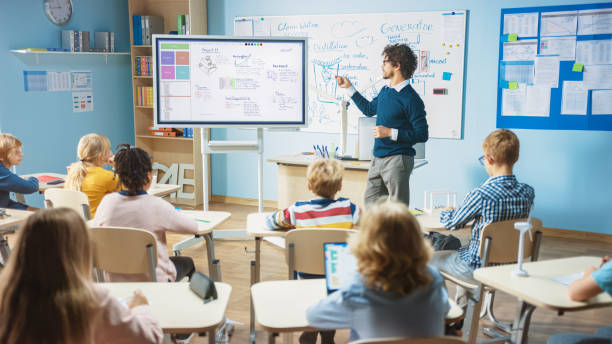Personalized Primary Science Tuition Singapore to Cater to Your Child’s Needs
Wiki Article
Discover the Necessary Advantages of Comprehending Main Scientific Research for Young Learners
The relevance of key scientific research education for young learners prolongs much past simple understanding procurement; it serves as a fundamental pillar in developing essential abilities such as crucial thinking, analytic, and creativity. Involving with clinical concepts through interactive and inquiry-based activities not only grows inquisitiveness but additionally lays the groundwork for resistant, certain learners.Enhancing Important Believing Skills
Fostering critical believing skills in young learners is necessary for their cognitive growth and future academic success. Essential thinking allows children to analyze info, assess evidence, and make notified decisions, which are crucial skills in today's information-rich culture. By taking part in clinical inquiry, young students can boost these skills as they discover concepts via observation, thinking, and experimentation.In main scientific research education and learning, teachers can promote important thinking by motivating trainees to ask inquiries, formulate hypotheses, and conduct experiments. This hands-on technique permits children to practice analytical and establish sensible thinking abilities. For example, when students examine the residential or commercial properties of materials or the principles of movement, they discover to examine their searchings for seriously and attract conclusions based upon evidence.
In addition, conversations and joint tasks can promote important reasoning by offering chances for learners to articulate their ideas, obstacle presumptions, and think about diverse point of views. By creating a supportive setting that values questions and representation, teachers can nurture vital thinking skills that empower young students to come to be lifelong students and independent thinkers. Inevitably, boosting these abilities lays a durable foundation for their future academic ventures and personal development.
Fostering Interest and Exploration

Main science education and learning supplies a structured atmosphere where young learners can check out numerous phenomena via hands-on experiments and observations. By permitting them to communicate with products and participate in inquiry-based understanding, educators develop opportunities for kids to formulate hypotheses, evaluate their concepts, and draw final thoughts. Such experiences support a sense of marvel and excitement regarding scientific research.

Structure Self-confidence in Trouble Addressing
Structure self-confidence in analytic is a crucial part of key scientific research education and learning that equips young learners to come close to obstacles with strength and imagination - primary science tuition Singapore. When kids are motivated to engage with clinical principles with hands-on activities and inquiry-based knowing, they develop essential abilities in essential reasoning and analysis. This procedure not only enhances their understanding of clinical concepts however also cultivates a feeling of possession over their discoveringTo build self-confidence, instructors ought to create an encouraging setting where errors are deemed opportunities for development instead of failings. This motivates trainees to take risks and discover numerous services to troubles. By supplying scaffolding and assistance, educators can help trainees browse complicated jobs, gradually raising their self-reliance in analytic situations.
Additionally, collective learning experiences, such as group tasks or experiments, can even more boost pupils' confidence as they learn to verbalize their ideas and listen to others' viewpoints. These communications support social abilities and enhance the idea that analytic is often a cumulative venture. Ultimately, cultivating self-confidence in problem-solving prepares young learners for future academic challenges and outfits them with the tools necessary for lifelong understanding.
Motivating Creative Thinking and Technology
In the realm of main scientific research education and learning, motivating imagination and advancement is crucial for cultivating a vibrant knowing atmosphere. By fostering a culture where young learners can check out ideas and experiment easily, instructors aid students create crucial thinking skills and a passion for discovery. Imagination in science urges kids to ask inquiries, devise hypotheses, and participate in hands-on tasks that promote their creativity.Integrating flexible projects and inquiry-based discovering into the educational program permits trainees to share their unique perspectives and solutions. When charged with resolving a problem related to their setting, pupils can brainstorm several strategies, leading to innovative outcomes that showcase their originality. This not only grows their understanding of clinical ideas however likewise infuses a sense of possession over their knowing process.
Moreover, creative science education supports cooperation amongst peers, as students usually share ideas and improve each other's understandings - primary science tuition Singapore. This joint spirit promotes not just advancement however likewise necessary social abilities. Therefore, by focusing on creativity and development in primary scientific research education and learning, we equip young students to believe critically, accept difficulties, and imagine possibilities, laying a solid structure for click for source long-lasting learning and expedition
Getting Ready For Future Knowing Challenges
Young learners' capability to browse future discovering challenges rests on a solid foundation in main scientific research education and learning. This foundational understanding gears up pupils with critical believing abilities and a systematic technique to analytic, necessary for taking on complex concerns in an ever-evolving globe. Primary science fosters inquiry-based discovering, encouraging trainees to ask questions, discover hypotheses, and involve in hands-on experiments.As they create these abilities, learners come to be adept at examining information, recognizing patterns, and drawing educated verdicts. Such expertises are essential not only in clinical areas however also in innovation, design, and mathematics (STEM), where interdisciplinary understanding is progressively essential.
Furthermore, key scientific research education and learning cultivates a sense of interest and durability in young learners, enabling them to watch challenges as possibilities for growth. As they come across and overcome barriers in their scientific explorations, they build confidence in their ability to innovate and adjust.
Ultimately, a strong foundation in main scientific research not only prepares young learners for academic searches however additionally furnishes them with the devices necessary for long-lasting understanding and adaptability in a swiftly altering global landscape. By buying key science education and learning, we are spending in the future possibility of our students.
Final Thought
Comprehending main scientific research is essential for young from this source students, as it cultivates essential thinking, interest, and imagination. Inevitably, the benefits of primary science education prepare youngsters for future scholastic quests and infuse lifelong knowing practices vital for growing in an ever-evolving world.The significance of primary science education for young learners extends much past plain expertise procurement; it serves as a basic pillar in establishing important skills such as crucial reasoning, problem-solving, and creativity. By developing an encouraging environment that values questions and representation, instructors can support important believing abilities that empower young learners to come to be independent thinkers and lifelong learners. Hence, linked here by prioritizing imagination and technology in key scientific research education and learning, we empower young students to assume seriously, accept obstacles, and imagine opportunities, laying a strong foundation for lifelong discovering and exploration.
Young learners' ability to browse future discovering challenges pivots on a solid foundation in key scientific research education and learning.Understanding main scientific research is crucial for young students, as it cultivates critical reasoning, interest, and creative thinking.
Report this wiki page